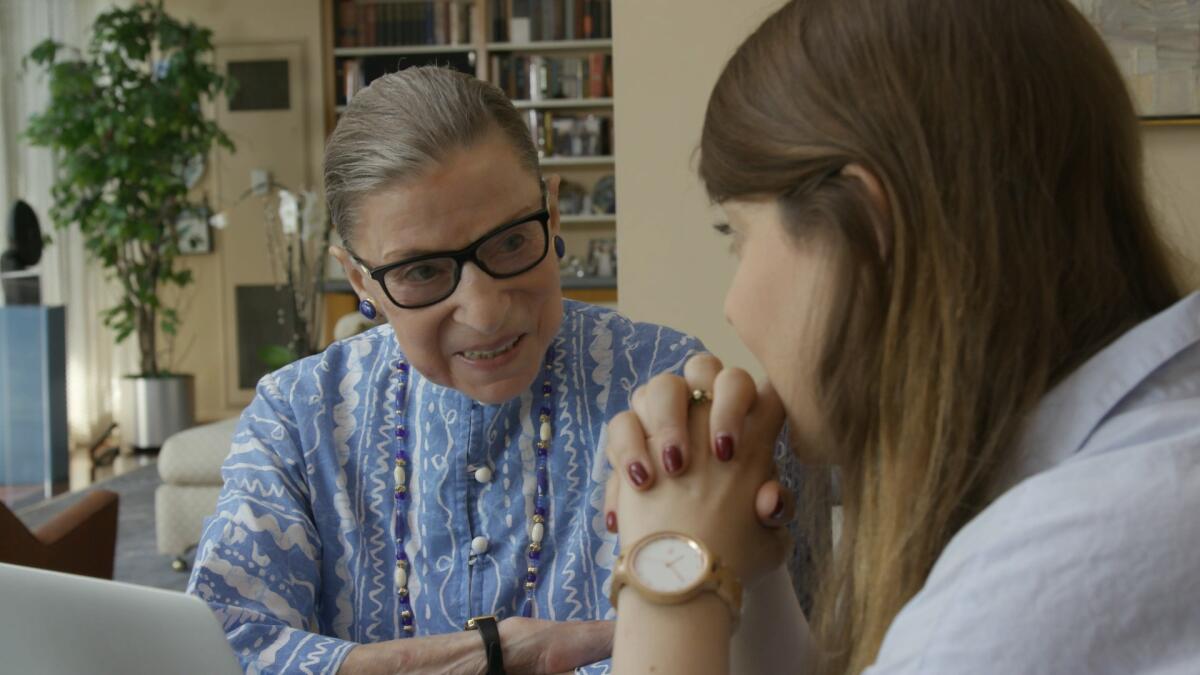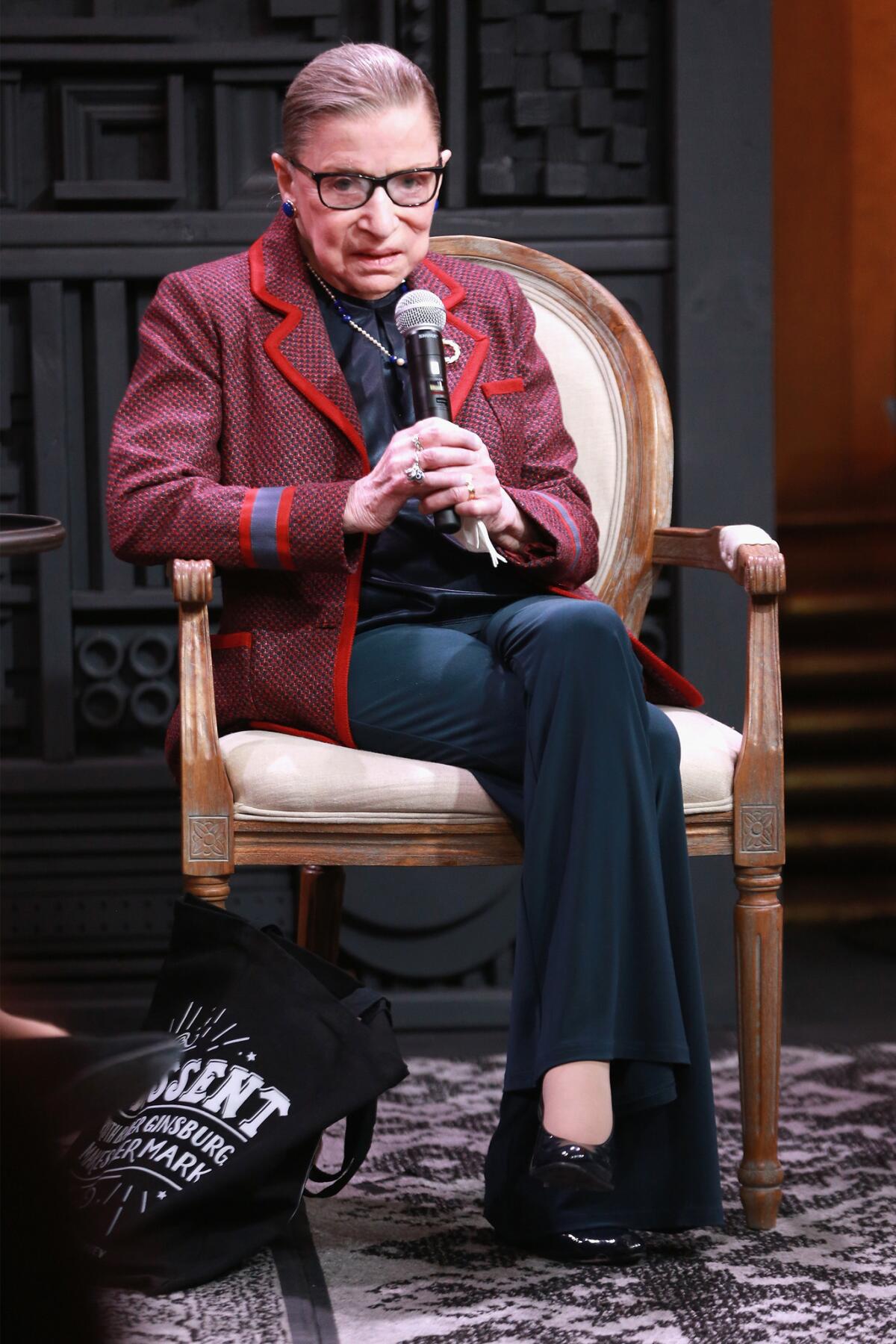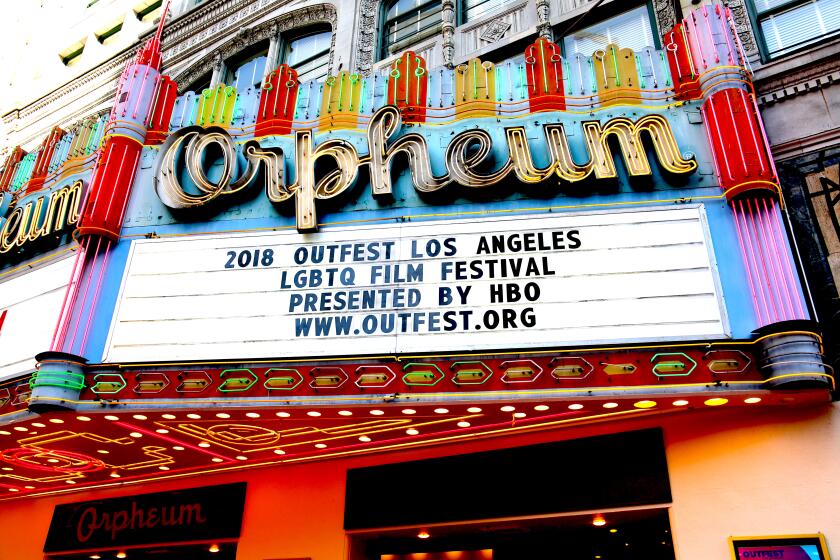Ruth Bader Ginsburg at Sundance on her new documentary, her #MeToo revelation and ‘SNL’s’ ‘Gins-burn’

It was just one day after an estimated million protesters had gathered in cities around the world for Women’s March first-anniversary events, including a crowd of hundreds in below-freezing Park City, Utah, where the Sundance Film Festival is in full swing. Combined with constant talk of a growing Time’s Up movement and a deluge of women-in-film panels, the call for female empowerment was strong.
Enter: Ruth Bader Ginsburg and her #MeToo revelation.
A crowd clamored around the Supreme Court justice when she arrived Sunday afternoon, holding up phones in futile attempts to grab a photo of the 5-foot-1 Ginsburg as she walked inside the Filmmakers Lodge on Main Street for a chat with NPR correspondent Nina Totenberg.
Ginsburg was at Sundance for the premiere of “RBG” — a documentary about the 84-year-old’s life from early childhood, her justiceship, her rise to cultural icon status (and “Notorious RBG” nickname), as well as her unprecedented critique of Donald Trump’s presidential campaign.
Three days later, the documentary was acquired by Magnolia Pictures and Participant Media for worldwide distribution, including theatrical, home video, SVOD and international television. CNN Films, which produced the project with Storyville Films, retains U.S. broadcast rights to RBG. A healthy Oscar campaign is sure to ensue, and Ginsburg’s increasingly iconic status will only boost interest.
Inside the Sundance premiere’s theater, the packed audience stole glances and whispered, “She’s here.”
The film opens with a barrage of sound bites from several men criticizing her.
“She’s an absolute disgrace to the Supreme Court,” then-presidential candidate Donald Trump is heard saying.
Several women then consecutively appear on screen to say otherwise.
“She’s the closest thing to a superhero I know,” Gloria Steinem asserts.
“RBG” directors and film creators Betsy West and Julie Cohen used footage from Ginsburg’s 1993 Supreme Court confirmation hearing as the film’s narrative spine. Also included are home movies and interviews with Ginsburg, her family, Steinem, Bill Clinton, Sen. Orrin Hatch, Totenberg and others to create a picture of her professional and personal life.
In person though, she showed the audience why she’s such an important voice for women of all ages. Asked by Totenberg about the “me too” movement. Ginsburg didn’t hesitate.
“I think it’s about time,” she said, before sharing her own experience.
Women woke up and complained.
— Ruth Bader Ginsburg
As an undergraduate student at Cornell University, she told the Sundance audience, an instructor gave her the answers to a test. Ginsburg knew that a sexual favor was the implied payment.

“I walked into his office and said, ‘How dare you? How dare you?’”
It was the early 1950s. At the time, “sexual harassment” wasn’t a phrase. It would be coined roughly two decades later, right around the time that Ginsburg co-founded the Women's Rights Project at the American Civil Liberties Union, and voiced her support for the Equal Rights Amendment.
“Women woke up and complained,” she says in the film.
A Rolodex of those women’s rights cases she fought for in the 1970s — some that she brought before the Supreme Court — intertwines with contemporaneous footage of women marching for equality. The film details two women’s rights cases that have come before the Supreme Court during Ginsburg’s tenure — one being the 1996 United States v. Virginia decision to overturn the Virginia Military Institute’s men-only policy. The other is Ledbetter v. Goodyear Tire & Rubber Co. — a 2007 case about gender discrimination that led to the establishment of the Lilly Ledbetter Fair Pay Act.
A man’s world, redefined
Throughout the film, the audience sees moments from Ginsburg’s personal life. Her love story with her late husband Marty, a constant supporter and champion of her work. Her home at the Watergate Complex. Her workout routine. Her relationship with her granddaughter, Clara Spera, who calls Ginsburg “Bubby” and has followed in her footsteps by getting a law degree from Harvard University.
The film also details her love for the opera, and how it bonded her with the late Justice Antonin Scalia and solidified their odd-couple friendship — he a conservative, she a liberal.
At one point, she’s shown Kate McKinnon’s “Saturday Night Live” parody of herself for what appears to be the first time. She is an instant fan.
“I would like to say ‘Gins-burn’ sometimes to my colleagues,” she told Totenberg earlier in the day about the catchphrase McKinnon’s character uses.
Before Ginsburg had to maneuver the intricacies of being a woman on a male-dominated court, she did so at Harvard University.
“How did it feel to be one of nine women in a class of over 500 men? You felt like you were constantly on display,” she said in the film.
“RBG” details Ginsburg’s personal fight against sexism, and how it rolled into her work’s mission to stand up for those impeded by gender.
‘We the People’ now includes people who were left out from the start.
— Ruth Bader Ginsburg
In one scene, she shows the variety of neckwear she displays above her robe — an idea she and former Justice Sandra Day O'Connor came up with as an answer to the ties their male colleagues wore. It’s a lighter moment, but one that shows a sliver of what Ginsburg and her fellow female colleagues have faced in a world of law first created and inhabited by men.
“Think about where we started,” Ginsburg said on stage after the film. “Who were the founders? Who were the people who counted? Who were the people who voted? They were all white men and property owners. Well, I think the genius of our Constitution is that over the course of well over two centuries, ‘We the People’ now includes people who were left out from the start.”
And as for those on both sides of the ideological spectrum who wonder how much longer she will be on the bench, Ginsburg has staffed law clerks through the 2020 term and told Totenberg in their earlier chat that she doesn’t have plans to retire anytime soon.
“It’s a tremendous honor that I have this job,” she said. “And a huge responsibility.”
Twitter: @cshalby
ALSO
Riding with Jane Fonda to the Sundance Film Festival's Respect Rally
Sundance 2018 diary: 'The Tale,' 'American Animals' blur the lines between fact and fiction
Only good movies
Get the Indie Focus newsletter, Mark Olsen's weekly guide to the world of cinema.
You may occasionally receive promotional content from the Los Angeles Times.








